Module 3 Unit 2 Buying new clothes 课件(共78张PPT)
文档属性
| 名称 | Module 3 Unit 2 Buying new clothes 课件(共78张PPT) |
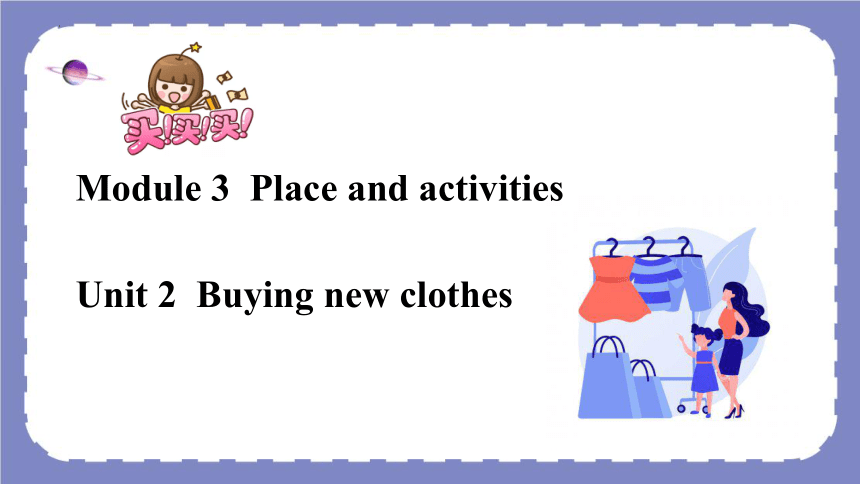
|
|
| 格式 | pptx | ||
| 文件大小 | 13.1MB | ||
| 资源类型 | 试卷 | ||
| 版本资源 | 牛津上海版(试用本) | ||
| 科目 | 英语 | ||
| 更新时间 | 2023-11-20 10:12:31 | ||
图片预览


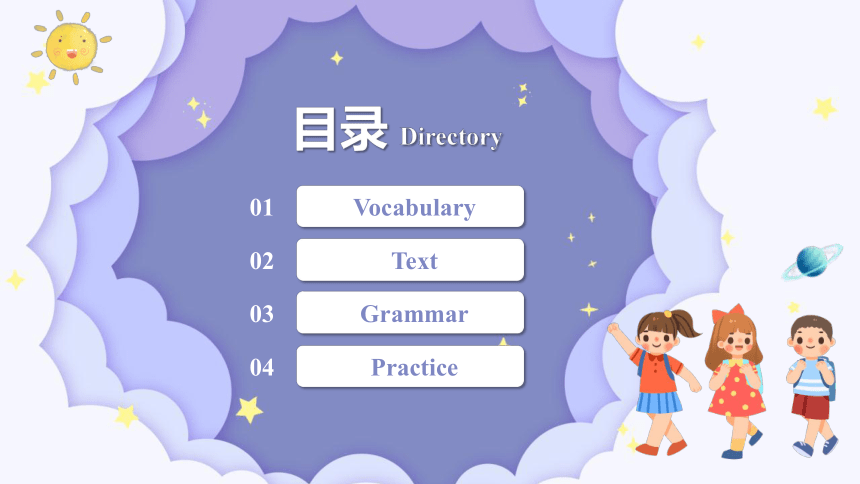
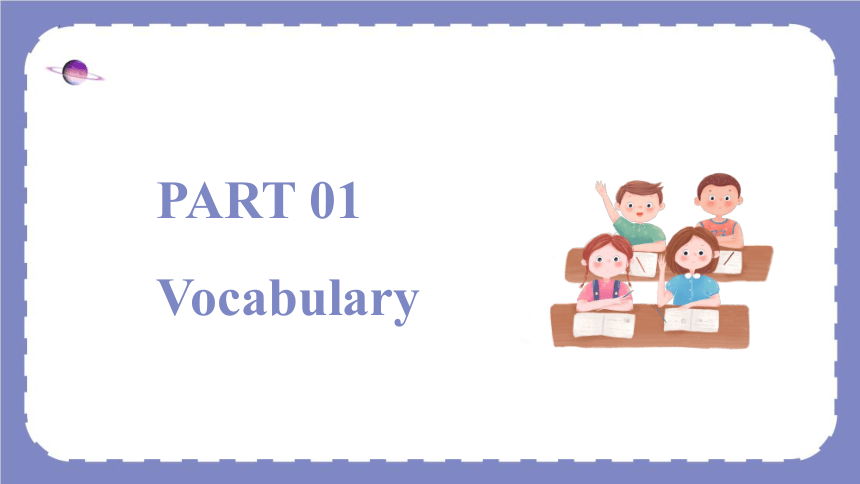
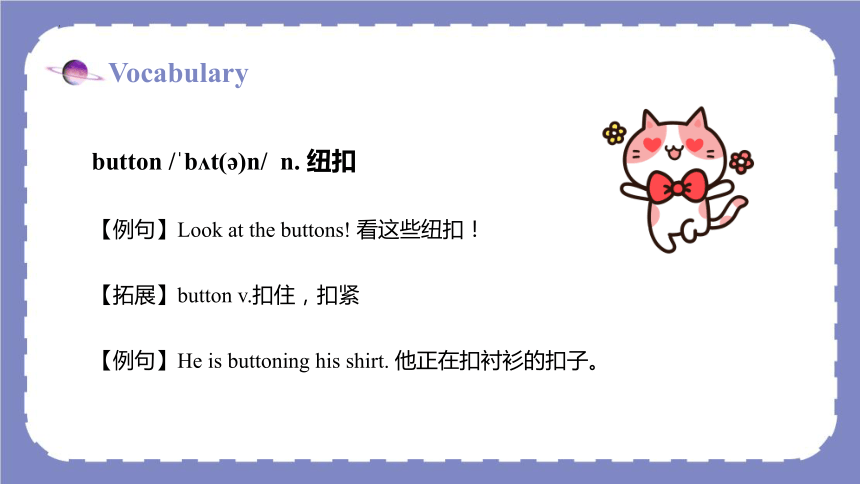
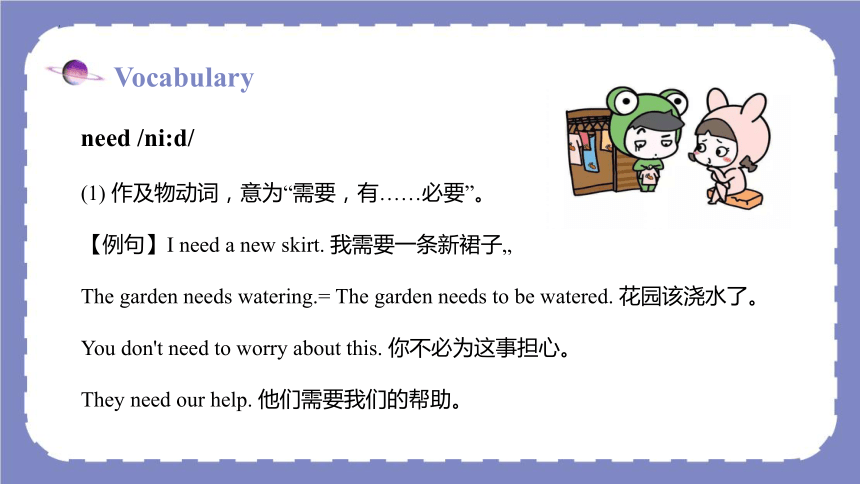
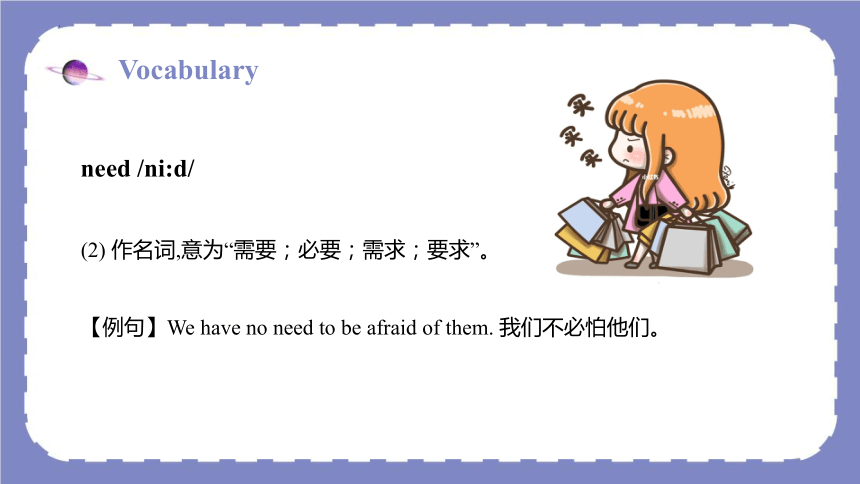
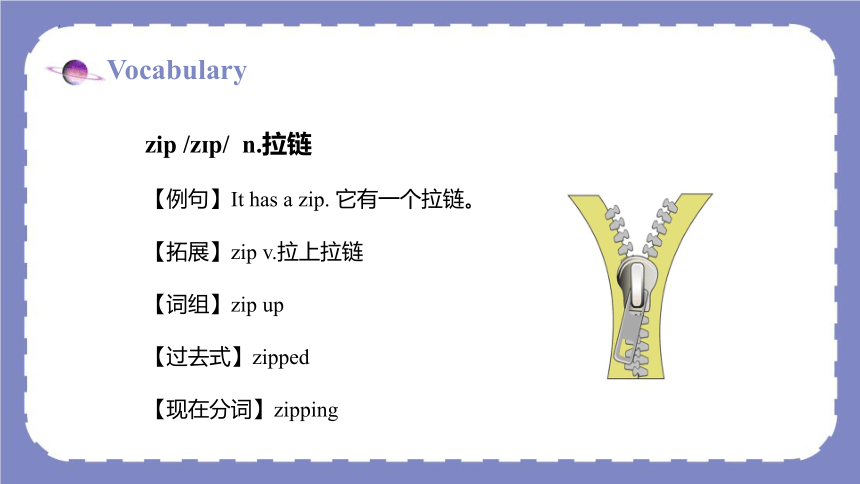
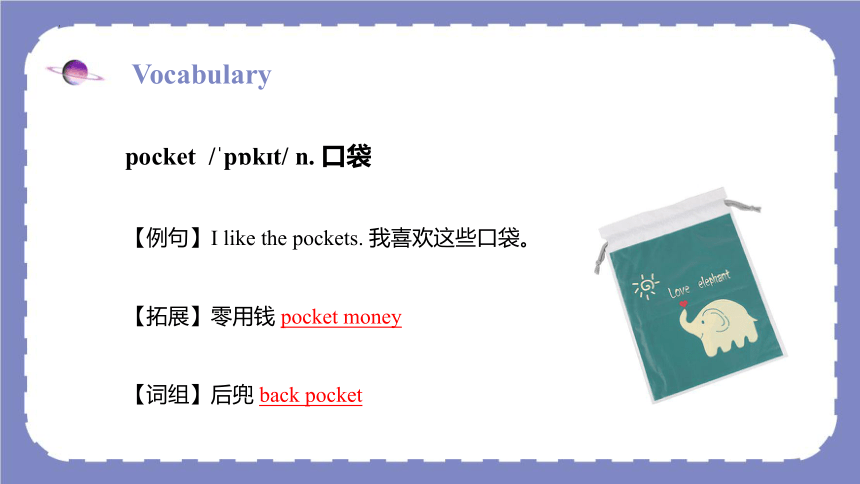
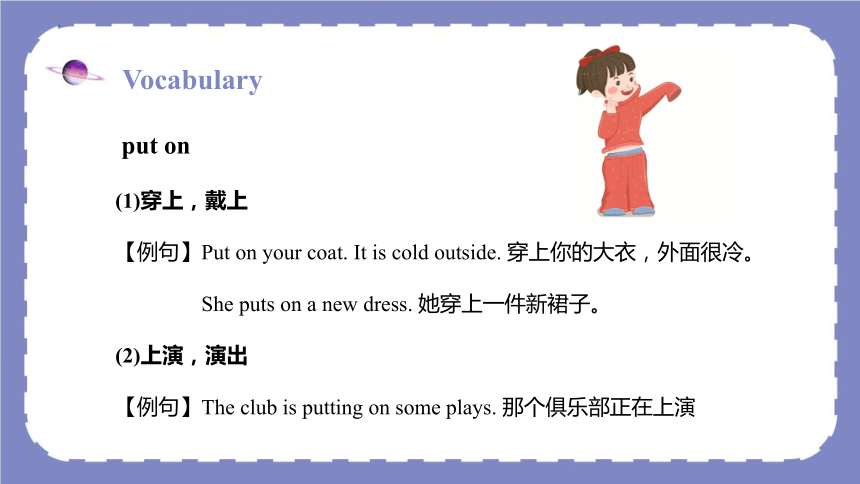
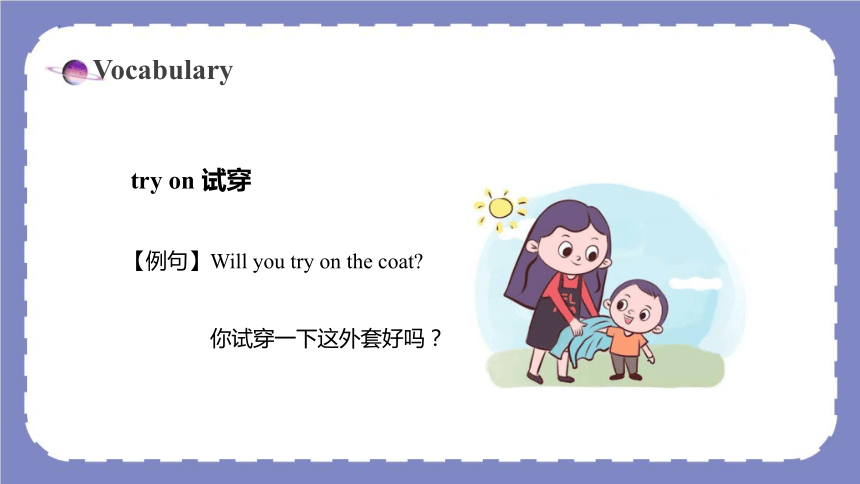
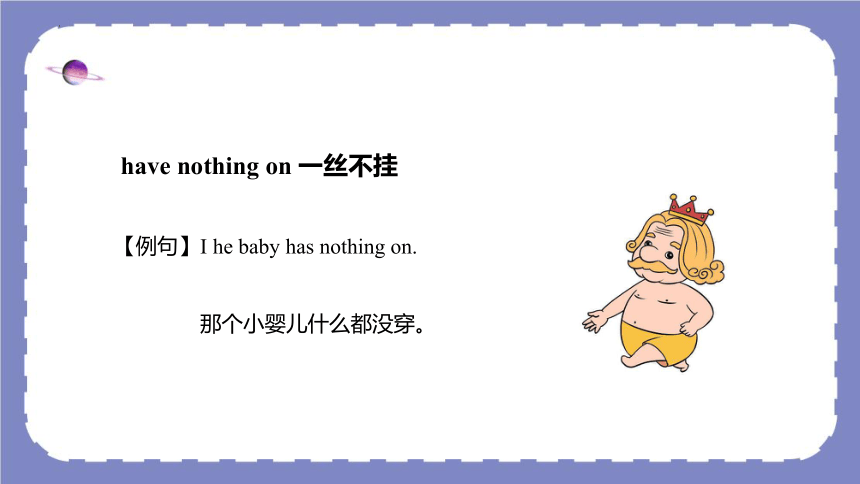
文档简介
(共78张PPT)
Module 3 Place and activities
Unit 2 Buying new clothes
学习目标
1. 理解并正确朗读衣饰类单词
which, trousers, sweater, coat, shoes, try.. on ,size
2. 理解句型 Which(pair of)... do you like, the ... one or the... one
I like the...one.简单谈论衣饰并选择自己的喜好。
3. 学习语音:/ :/ 和 / /
01
Vocabulary
02
Text
03
Grammar
04
Practice
目录 Directory
行业PPT模板http:///hangye/
PART 01
Vocabulary
button / b t( )n/ n. 纽扣
【例句】Look at the buttons! 看这些纽扣!
【拓展】button v.扣住,扣紧
【例句】He is buttoning his shirt. 他正在扣衬衫的扣子。
Vocabulary
need /ni:d/
(1) 作及物动词,意为“需要,有……必要”。
【例句】I need a new skirt. 我需要一条新裙子
The garden needs watering.= The garden needs to be watered. 花园该浇水了。
You don't need to worry about this. 你不必为这事担心。
They need our help. 他们需要我们的帮助。
Vocabulary
need /ni:d/
(2) 作名词,意为“需要;必要;需求;要求”。
【例句】We have no need to be afraid of them. 我们不必怕他们。
Vocabulary
Vocabulary
zip /z p/ n.拉链
【例句】It has a zip. 它有一个拉链。
【拓展】zip v.拉上拉链
【词组】zip up
【过去式】zipped
【现在分词】zipping
pocket / p k t/ n. 口袋
【例句】I like the pockets. 我喜欢这些口袋。
【拓展】零用钱 pocket money
【词组】后兜 back pocket
Vocabulary
Vocabulary
put on
(1)穿上,戴上
【例句】Put on your coat. It is cold outside. 穿上你的大衣,外面很冷。
She puts on a new dress. 她穿上一件新裙子。
(2)上演,演出
【例句】The club is putting on some plays. 那个俱乐部正在上演
Vocabulary
try on 试穿
【例句】Will you try on the coat
你试穿一下这外套好吗?
have nothing on 一丝不挂
【例句】I he baby has nothing on.
那个小婴儿什么都没穿。
Daily expressions 日常表达
1. Good idea!
2. What do you think,... ?
3. Which dress do you like
4. Why not try on both
PART 02
Text
Listen and say
Which ... do you like, the... one or the... one
I like the ... one.
It is Sunday morning. Kitty puts on her dress. It is too small. She needs a new one.
Listen and say
Which ... do you like, the... one or the... one
I like the ... one.
Kitty and her mother are at a clothes shop. They are looking at the dresses.
Listen and say
Mum: Which dress do you like, the blue one or the pink one
Kitty: I like the blue one. It has pockets. It's pretty.
Mum: Yes. But the pink one is lovely too. Look at the buttons! Why not try on both
Kitty: Good idea!
put on... 穿上...(强调动作)
clothes shop 服装店
look at….. 看着…..
pocket 口袋
pretty 漂亮的
button 纽扣
try on both 两个都试一试
Look and learn
Ask and answer
Ask and answer
T: Which... do you like
S: I like the ... one(s). It has/They have...
T: How much is it/are they
S: It's .../They are...
Ask and answer
T: Which... do you like
S: I like the ... one(s). It has/They have...
T: How much is it/are they
S: It's .../They are...
Say and act
Buying a dress
Shop assistant: Can I help you
Kitty: Can I try on these dresses
Shop assistant: Sure.
Kitty: Thanks.
Say and act
Kitty: They're both pretty. What do you think, Mum
Mrs Li: They both look great on you. Which dress do you want
Kitty: Let me see. I want the blue one. I like the pockets.
Mrs Li: OK. Then let's take the blue one. How much is it
Shop assistant: It's 80 yuan.
both 都
look + adj. + on sb.
穿在某人身上看起来...
take... 买
Read a story
The emperor's new clothes
One day, a man visits the emperor with some new clothes.
Read a story
The emperor's new clothes
'I have some magic clothes. They're very beautiful,' says the man, 'But only clever people can see them!
Read a story
The emperor's new clothes
The man opens his box. The emperor cannot see any clothes, but he nods with a big smile and says, 'They're so beautiful!' So the emperor gives the man a lot of money and puts on the new clothes.
Read a story
The emperor's new clothes
The emperor walks down the street. People keep silent. But a child cries out, 'Look! He has nothing on!
Answer the questions
1 What does the man say about the magic clothes
2 Are there any clothes in the box
3 Can people see the emperor's 'new clothes'
4 Who is telling the truth
Listen and enjoy
Learn the sounds
Sounds T or F1. ( ) pocket hospital 2.( )clothes cloth 3. ( ) bakery lace4. ( ) button under 5. ( ) zip stripe 6. ( )which size 7. ( ) his is 8. ( ) price cup 9. ( )duck picnic
PART 03
Grammar
Eg,Where do you come from
疑问词 + 一般疑问句
结构:特殊疑问词 + 一般疑问句
特殊疑问句
你能帮我找到我的搭档吗?
疑问词
what
who
whose
which
when
where
why
how
谁
哪一个
什么
为什么
谁的
何时
哪里
怎样
how long
how far
how often
how soon
how many
how much
how old
多远
多久一次
问年龄
多长时间
多少(问数量-可数名词)
多少(问价钱;问数量-不可数名词)
多快,多久以后
你能帮我找到我的搭档吗?
疑问词
划线提问解题步骤
四删除
一定
Content
Content
二移
(或加)
三变化
例1:He lives in Shanghai.
Where + does he live ?
例2:Kitty's eating a banana at home.
What + is she eating
1. I can see a clock on the wall.
2. The girl is standing under the tree.
3. His father is a doctor.
4. It's ten minutes' walk from my home to the school.
1. What can you see on the wall
2. Where is the girl standing
3. What is his father
4. How far is it from your home to the school
特殊疑问词How
How开头的特殊疑问句
1.问身体健康、天气状况等情况 How are your parents 你父母身体怎么样?
2.询问程度 How do you like this book 你觉得这本书怎么样?
3.询问数量 How much milk is there in the glass 玻璃杯里有多少牛奶?
4.询问价格 How much is the eraser 这块橡皮擦多少钱?
特殊疑问词How
How开头的特殊疑问句
5.询问频率 How often does he come here 他(每隔)多久来一次
6.询问时间长度 How long did he stay here 他在这儿呆了多久
7.询问年龄 How old are you 你多大了?
特殊疑问词When和which引导的特殊疑问句及选择疑问句的用法
1.疑问副词When表示何时
疑问代词which表示哪一个:对主语和宾语提问
例1. When were you born 你何时出生的?
例2. Which one do you like 你喜欢哪一个?
2.选择疑问的用法
1、选择疑问句是指提供两种或多种情况供对方选择的疑问句。其表现形式可以是一般疑问句形式,也可以是特殊疑问句形式,选项之间要用连词or连接。
2、 一般疑问句形式的选择疑问句
一般疑问句形式的选择疑问句由“一般疑问句+or+选择部分”构成:
例1. Are you a doctor or a teacher? 你是医生还是教师?
例2. Does he like this or that? 他喜欢这个还是喜欢那个?
【注】有时选择部分用or not来表示:
例1. Are you ready or not? 你准备好没有?
例2. Do you like the film or not? 你喜不喜欢这部电影?
3. 特殊疑问句形式的选择疑问句由“特殊疑问句,选项A+or+选项B”:
例1. Which would you like, tea or coffee? 你想要哪样,是茶还是咖啡?
例2. Who runs faster, you or Tom? 你和汤姆谁跑得快一点?
例3. When shall we leave, today or tomorrow?
我们什么时候离开,今天还是明天?
祈使句要点复习
1.基本句型:
1.动词原形+其他 否定形式:Don’t+原句
2.Be+ n./adj. 否定形式:Don’t+原句
3.Let+宾语+动词原形+其他
否定形式:①Don’t+原句 ②Let+宾语+not+动词原形+其他
4.No+doing
2.祈使句的反意疑问句
1.肯定祈使:will/won’t you
2.否定祈使:will you
3.Let’s: shall we
4.Let us: will/won’t you
用于提建议的其他句型:
Why not do sth. = Why don't you do sth.
Let's do sth.Shall we do sth.
How about doing sth.
What about doing sth.
连词or
(1) or作连词.可以用于否定的并列句中。
【例句】I can't swim or skate. 我不会游泳,也不会滑冰。
(2) or也可以用于选择疑问句中。
【例句】 Which do you like, the blue dress or the red one
蓝色的裙子和红色的裙子,你喜欢哪一个?
one的用法
不定代词one可以指代可数名词,既可以指人也可以指物,其复数形式为ones,所有格为one’s.
【例句】 I don't have a pen. Can you lend me one
我没有钢笔,能借我一支吗
I don t have a red hag. The blue one is mine.
我没有红色的书包,那个蓝色的是我的。
PART 04
Sentences
Kitty puts on her dress. 凯蒂穿上她的裙子。
put on意为“穿”,表示穿的动作。
【例句】 Mary puts on her lovely skirt and goes to school happily.
玛丽穿上她可爱的裙子,高高兴兴地上学去了。
批注: 辨析:put on,wear和dress
(1) put on意为“穿”,表示穿的动作,后接穿的衣服。
(2) wear意为“穿”,表示穿的状态,后接穿的衣服。
【例句】 He always wears black clothes.
他总是穿着黑色的衣服。
(3) dress也意为“穿”,后接sb或oneself。
【例句】 Tom, dress your little brother, please. I have no time.
汤姆,给你弟弟穿衣服,我没时间了。
Little Tom is too young to dress himself.
小汤姆太小了,不能自己穿衣服。
2. It is too small But the pink one is lovely too. 裙子太小了。但是那个粉色的裙子也很可爱。
这两个句子中都有单词too,但是意思不同。
第一个句子中的too是程度副词,意为“太”,第二个句子中的too是“也”的意思。
【例句】He is too young to go to school.
他太小了,不能去上学。(还没到上学的年龄)
【拓展延伸】too当“也”讲时注意和also,either的区别。
too 一般用于肯定句句末,also用于肯定句句中。either用于否定句句末.都表示“也”的意思。
【例句】He likes swimming. I like swimming. too.
He likes swimming. I also like swimming.
他喜欢游泳,我也喜欢游泳。
He doesn't like swimming. I don’t like swimming, either.
他不喜欢游泳,我也不喜欢游泳。
3. How much is it 它多少钱
How much... ?用来询问价钱,
【例句】How much is the dress
这条裙子多少钱?
4. What do you think, Mum 你认为怎么样,妈妈?
What do you think...?用来征求对方的意见。
【例句】This coat is beautiful. What do you think, Jack
这件大衣很漂亮,杰克。你认为呢?
5. One day, a man visits the emperor with some new clothes.
一天,一个男人带了一些新衣服去拜访皇帝。
visit意为“拜访,参观”,后接某人或某地。
【例句】I go to visit my grandfather on Sunday.
我每星期都去看望爷爷
I visit Beijing every year. 我每年都去参观北京。
6. So the emperor gives the man a lot of money and 'puts on' the new clothes.
因此皇帝给了那个男人许多钱,而且“穿上”了那些新衣服。
give意为“给”,可以接双宾语,即give sb sth= give sth to sb.
【例句】Mother gives me 2 books as a Rift.
= Mother gives 2 books to me as a gift.
妈妈给了我两本书作为礼物。
7. People keep silent. 人们鸦雀无声。
keep后接形容词作表语或宾语补足语。
【例句】Keep quiet! 安静!
He keeps his eyes open/ closed. 他睁/闭着眼睛。
PART 05
Practice
Write the words according to the underlined words (写同类词)1. I go home by bicycle. Mary goes home by _____________.2. This new pencil case is too dear. But that one’s ____________.3. My grandfather reads a newspaper and my grandma ________TV every day.4. Tom is at KFC. He wants a hot dog, a _________ and some French fries.5. My coat has some buttons and a __________.
Change the sentence1. I like the blue dress. It has pockets.(同义句)I like the blue dress ________ pockets.2. He likes the white shirt. It has a zip. (同义句) ________________________________3. Ben likes the yellow coat. It has stripes. (同义句) ________________________________
Read and fill in the blanks(用所给单词的适当形式填空,每线词数不限)1. Look at the ________(dress). They are small.2. The emperor cannot see ________(some)clothes.3. Why not ________(try) on these shoes 4. The child ________(cry) out,” Look! That’s a lion ”5. How ________(many) water is there in the bottle 6. It’s seven thirty. The Zhangs __________(watch) TV.
Read and choose(选择最佳答案,将字母代号写在前面的括号内)( ) 1. Here ________a pair of boots for you. A.are B.is C.am( ) 2. Look! The boy ________ a new hat. A.is putting on B.putting on C.putting( ) 3. Can I try ________ these boot A.for B.to C.on
( ) 4. These two dresses ________ great ________ you. A.look both; to B.both look; on C.both look; to( ) 5. ________ dress do you want, the green one or the red one A. Who B. Which C. Where ( ) 6. --____ are the shirts -- 80yuan.A. How much B. How C. How many
( ) 7. Kitty’s dress is ________ small. She ________ a big one. A.to; need B.too; need C.too; needs( ) 8. There is a ________ on my coat. I can put my hands in it. A.pocket B.zip C.button( ) 9. At last, the emperor has ________on! A.no thing B.nothing C.anything( ) 10. Kitty and her friends are at a ________. A.shop clothes B.clothes shop C.clothes’ shop
用疑问词填空1. -________did you spend? -Sorry,I couldn't remember it. Maybe it was 200 yuan. 2. -________are you going to buy ---I'm going to buy some books.. 3. -________does your father help with -Liu Yun. 4. -________are you going ---The shopping mall.5. -________days did you spend in Beijing on vacation -20 days.
对划线部分进行提问1. I visit my grandfather once a week. ________ _________ do you visit your grandfather 2. We went to Shanghai Museum by taxi yesterday. _________ _________ you go to Shanghai Museum yesterday 3. She often takes a bath once a day. _______ ________ _________ she take a bath
4. Jack has been to the USA four times. _______ _______ __________ has Jack been to the USA 5. There is a bookshelf in the room. How _____ ____________ are there in the room 6. I was in Shanghai two years ago. _________ _________ you two years ago 7. My brother likes Chinese best. _________ _________ does your brother like best
8. I went to school on foot yesterday. _________ _________ you ________to school yesterday 9. We had noodles for lunch yesterday. _______ _______ you ________ for lunch yesterday 10. Betty goes to school at half past seven. (就划线部分提问) _________ does Betty ________ to school
Read and fill in the blanks(用所给单词的适当形式填空)1. It ________ (be) hot yesterday. The children ________ (go) swimming at the beach.There ________ (be) many ________ (people) there. They enjoyed ________ (them) all.2. Hello! Here ________ (be) the weather report. We ________ (have) a cool day yesterday. And today we still ________ (have) a cool day. The temperature is 26 degrees. But tomorrow we ________ (have) a hot day. The temperature will be 32 degrees. That's the report for today. Thank your for ________ (watch).
Write "T"or "F" Danny's mother is ill. There is no food in the fridge(冰箱). He wants to buy something in the supermarket. Danny has got 100 yuan in his pocket. Now he is in the supermarket. He is looking for the food on the shopping list . He wants a packet of rice. It's thirty yuan. He wants some noodles. They are two yuan each kilo(千克). Vegetables are three yuan each kilo. Fruit is three yuan each kilo. Eggs are four yuan each kilo. The orange juice is twelve yuan each bottle. There is no fresh fish left in the supermarket. Danny doesn't want it When he goes out of the supermarket, he has got twenty yuan in his pocket.
( ) 1. Danny's mother is tired.( ) 2. Danny has got one hundred yuan in the pocket. ( ) 3. Danny is buying food in the market. ( ) 4. He has got a shopping list. ( ) 5. Fruit is three yuan each kilo. ( ) 6. Eggs are two yuan each kilo.
Read and label the map.Our school is beautiful. There are flowers and tall trees in it. Our school is also big with two classroom buildings on the right of the school playground. Behind the two classroom buildings there is a library. On the left of the playground there is a big hall. The office building is in front of the hall.
1. 2. 3. 4. 5.
Thank you!
Module 3 Place and activities
Unit 2 Buying new clothes
学习目标
1. 理解并正确朗读衣饰类单词
which, trousers, sweater, coat, shoes, try.. on ,size
2. 理解句型 Which(pair of)... do you like, the ... one or the... one
I like the...one.简单谈论衣饰并选择自己的喜好。
3. 学习语音:/ :/ 和 / /
01
Vocabulary
02
Text
03
Grammar
04
Practice
目录 Directory
行业PPT模板http:///hangye/
PART 01
Vocabulary
button / b t( )n/ n. 纽扣
【例句】Look at the buttons! 看这些纽扣!
【拓展】button v.扣住,扣紧
【例句】He is buttoning his shirt. 他正在扣衬衫的扣子。
Vocabulary
need /ni:d/
(1) 作及物动词,意为“需要,有……必要”。
【例句】I need a new skirt. 我需要一条新裙子
The garden needs watering.= The garden needs to be watered. 花园该浇水了。
You don't need to worry about this. 你不必为这事担心。
They need our help. 他们需要我们的帮助。
Vocabulary
need /ni:d/
(2) 作名词,意为“需要;必要;需求;要求”。
【例句】We have no need to be afraid of them. 我们不必怕他们。
Vocabulary
Vocabulary
zip /z p/ n.拉链
【例句】It has a zip. 它有一个拉链。
【拓展】zip v.拉上拉链
【词组】zip up
【过去式】zipped
【现在分词】zipping
pocket / p k t/ n. 口袋
【例句】I like the pockets. 我喜欢这些口袋。
【拓展】零用钱 pocket money
【词组】后兜 back pocket
Vocabulary
Vocabulary
put on
(1)穿上,戴上
【例句】Put on your coat. It is cold outside. 穿上你的大衣,外面很冷。
She puts on a new dress. 她穿上一件新裙子。
(2)上演,演出
【例句】The club is putting on some plays. 那个俱乐部正在上演
Vocabulary
try on 试穿
【例句】Will you try on the coat
你试穿一下这外套好吗?
have nothing on 一丝不挂
【例句】I he baby has nothing on.
那个小婴儿什么都没穿。
Daily expressions 日常表达
1. Good idea!
2. What do you think,... ?
3. Which dress do you like
4. Why not try on both
PART 02
Text
Listen and say
Which ... do you like, the... one or the... one
I like the ... one.
It is Sunday morning. Kitty puts on her dress. It is too small. She needs a new one.
Listen and say
Which ... do you like, the... one or the... one
I like the ... one.
Kitty and her mother are at a clothes shop. They are looking at the dresses.
Listen and say
Mum: Which dress do you like, the blue one or the pink one
Kitty: I like the blue one. It has pockets. It's pretty.
Mum: Yes. But the pink one is lovely too. Look at the buttons! Why not try on both
Kitty: Good idea!
put on... 穿上...(强调动作)
clothes shop 服装店
look at….. 看着…..
pocket 口袋
pretty 漂亮的
button 纽扣
try on both 两个都试一试
Look and learn
Ask and answer
Ask and answer
T: Which... do you like
S: I like the ... one(s). It has/They have...
T: How much is it/are they
S: It's .../They are...
Ask and answer
T: Which... do you like
S: I like the ... one(s). It has/They have...
T: How much is it/are they
S: It's .../They are...
Say and act
Buying a dress
Shop assistant: Can I help you
Kitty: Can I try on these dresses
Shop assistant: Sure.
Kitty: Thanks.
Say and act
Kitty: They're both pretty. What do you think, Mum
Mrs Li: They both look great on you. Which dress do you want
Kitty: Let me see. I want the blue one. I like the pockets.
Mrs Li: OK. Then let's take the blue one. How much is it
Shop assistant: It's 80 yuan.
both 都
look + adj. + on sb.
穿在某人身上看起来...
take... 买
Read a story
The emperor's new clothes
One day, a man visits the emperor with some new clothes.
Read a story
The emperor's new clothes
'I have some magic clothes. They're very beautiful,' says the man, 'But only clever people can see them!
Read a story
The emperor's new clothes
The man opens his box. The emperor cannot see any clothes, but he nods with a big smile and says, 'They're so beautiful!' So the emperor gives the man a lot of money and puts on the new clothes.
Read a story
The emperor's new clothes
The emperor walks down the street. People keep silent. But a child cries out, 'Look! He has nothing on!
Answer the questions
1 What does the man say about the magic clothes
2 Are there any clothes in the box
3 Can people see the emperor's 'new clothes'
4 Who is telling the truth
Listen and enjoy
Learn the sounds
Sounds T or F1. ( ) pocket hospital 2.( )clothes cloth 3. ( ) bakery lace4. ( ) button under 5. ( ) zip stripe 6. ( )which size 7. ( ) his is 8. ( ) price cup 9. ( )duck picnic
PART 03
Grammar
Eg,Where do you come from
疑问词 + 一般疑问句
结构:特殊疑问词 + 一般疑问句
特殊疑问句
你能帮我找到我的搭档吗?
疑问词
what
who
whose
which
when
where
why
how
谁
哪一个
什么
为什么
谁的
何时
哪里
怎样
how long
how far
how often
how soon
how many
how much
how old
多远
多久一次
问年龄
多长时间
多少(问数量-可数名词)
多少(问价钱;问数量-不可数名词)
多快,多久以后
你能帮我找到我的搭档吗?
疑问词
划线提问解题步骤
四删除
一定
Content
Content
二移
(或加)
三变化
例1:He lives in Shanghai.
Where + does he live ?
例2:Kitty's eating a banana at home.
What + is she eating
1. I can see a clock on the wall.
2. The girl is standing under the tree.
3. His father is a doctor.
4. It's ten minutes' walk from my home to the school.
1. What can you see on the wall
2. Where is the girl standing
3. What is his father
4. How far is it from your home to the school
特殊疑问词How
How开头的特殊疑问句
1.问身体健康、天气状况等情况 How are your parents 你父母身体怎么样?
2.询问程度 How do you like this book 你觉得这本书怎么样?
3.询问数量 How much milk is there in the glass 玻璃杯里有多少牛奶?
4.询问价格 How much is the eraser 这块橡皮擦多少钱?
特殊疑问词How
How开头的特殊疑问句
5.询问频率 How often does he come here 他(每隔)多久来一次
6.询问时间长度 How long did he stay here 他在这儿呆了多久
7.询问年龄 How old are you 你多大了?
特殊疑问词When和which引导的特殊疑问句及选择疑问句的用法
1.疑问副词When表示何时
疑问代词which表示哪一个:对主语和宾语提问
例1. When were you born 你何时出生的?
例2. Which one do you like 你喜欢哪一个?
2.选择疑问的用法
1、选择疑问句是指提供两种或多种情况供对方选择的疑问句。其表现形式可以是一般疑问句形式,也可以是特殊疑问句形式,选项之间要用连词or连接。
2、 一般疑问句形式的选择疑问句
一般疑问句形式的选择疑问句由“一般疑问句+or+选择部分”构成:
例1. Are you a doctor or a teacher? 你是医生还是教师?
例2. Does he like this or that? 他喜欢这个还是喜欢那个?
【注】有时选择部分用or not来表示:
例1. Are you ready or not? 你准备好没有?
例2. Do you like the film or not? 你喜不喜欢这部电影?
3. 特殊疑问句形式的选择疑问句由“特殊疑问句,选项A+or+选项B”:
例1. Which would you like, tea or coffee? 你想要哪样,是茶还是咖啡?
例2. Who runs faster, you or Tom? 你和汤姆谁跑得快一点?
例3. When shall we leave, today or tomorrow?
我们什么时候离开,今天还是明天?
祈使句要点复习
1.基本句型:
1.动词原形+其他 否定形式:Don’t+原句
2.Be+ n./adj. 否定形式:Don’t+原句
3.Let+宾语+动词原形+其他
否定形式:①Don’t+原句 ②Let+宾语+not+动词原形+其他
4.No+doing
2.祈使句的反意疑问句
1.肯定祈使:will/won’t you
2.否定祈使:will you
3.Let’s: shall we
4.Let us: will/won’t you
用于提建议的其他句型:
Why not do sth. = Why don't you do sth.
Let's do sth.Shall we do sth.
How about doing sth.
What about doing sth.
连词or
(1) or作连词.可以用于否定的并列句中。
【例句】I can't swim or skate. 我不会游泳,也不会滑冰。
(2) or也可以用于选择疑问句中。
【例句】 Which do you like, the blue dress or the red one
蓝色的裙子和红色的裙子,你喜欢哪一个?
one的用法
不定代词one可以指代可数名词,既可以指人也可以指物,其复数形式为ones,所有格为one’s.
【例句】 I don't have a pen. Can you lend me one
我没有钢笔,能借我一支吗
I don t have a red hag. The blue one is mine.
我没有红色的书包,那个蓝色的是我的。
PART 04
Sentences
Kitty puts on her dress. 凯蒂穿上她的裙子。
put on意为“穿”,表示穿的动作。
【例句】 Mary puts on her lovely skirt and goes to school happily.
玛丽穿上她可爱的裙子,高高兴兴地上学去了。
批注: 辨析:put on,wear和dress
(1) put on意为“穿”,表示穿的动作,后接穿的衣服。
(2) wear意为“穿”,表示穿的状态,后接穿的衣服。
【例句】 He always wears black clothes.
他总是穿着黑色的衣服。
(3) dress也意为“穿”,后接sb或oneself。
【例句】 Tom, dress your little brother, please. I have no time.
汤姆,给你弟弟穿衣服,我没时间了。
Little Tom is too young to dress himself.
小汤姆太小了,不能自己穿衣服。
2. It is too small But the pink one is lovely too. 裙子太小了。但是那个粉色的裙子也很可爱。
这两个句子中都有单词too,但是意思不同。
第一个句子中的too是程度副词,意为“太”,第二个句子中的too是“也”的意思。
【例句】He is too young to go to school.
他太小了,不能去上学。(还没到上学的年龄)
【拓展延伸】too当“也”讲时注意和also,either的区别。
too 一般用于肯定句句末,also用于肯定句句中。either用于否定句句末.都表示“也”的意思。
【例句】He likes swimming. I like swimming. too.
He likes swimming. I also like swimming.
他喜欢游泳,我也喜欢游泳。
He doesn't like swimming. I don’t like swimming, either.
他不喜欢游泳,我也不喜欢游泳。
3. How much is it 它多少钱
How much... ?用来询问价钱,
【例句】How much is the dress
这条裙子多少钱?
4. What do you think, Mum 你认为怎么样,妈妈?
What do you think...?用来征求对方的意见。
【例句】This coat is beautiful. What do you think, Jack
这件大衣很漂亮,杰克。你认为呢?
5. One day, a man visits the emperor with some new clothes.
一天,一个男人带了一些新衣服去拜访皇帝。
visit意为“拜访,参观”,后接某人或某地。
【例句】I go to visit my grandfather on Sunday.
我每星期都去看望爷爷
I visit Beijing every year. 我每年都去参观北京。
6. So the emperor gives the man a lot of money and 'puts on' the new clothes.
因此皇帝给了那个男人许多钱,而且“穿上”了那些新衣服。
give意为“给”,可以接双宾语,即give sb sth= give sth to sb.
【例句】Mother gives me 2 books as a Rift.
= Mother gives 2 books to me as a gift.
妈妈给了我两本书作为礼物。
7. People keep silent. 人们鸦雀无声。
keep后接形容词作表语或宾语补足语。
【例句】Keep quiet! 安静!
He keeps his eyes open/ closed. 他睁/闭着眼睛。
PART 05
Practice
Write the words according to the underlined words (写同类词)1. I go home by bicycle. Mary goes home by _____________.2. This new pencil case is too dear. But that one’s ____________.3. My grandfather reads a newspaper and my grandma ________TV every day.4. Tom is at KFC. He wants a hot dog, a _________ and some French fries.5. My coat has some buttons and a __________.
Change the sentence1. I like the blue dress. It has pockets.(同义句)I like the blue dress ________ pockets.2. He likes the white shirt. It has a zip. (同义句) ________________________________3. Ben likes the yellow coat. It has stripes. (同义句) ________________________________
Read and fill in the blanks(用所给单词的适当形式填空,每线词数不限)1. Look at the ________(dress). They are small.2. The emperor cannot see ________(some)clothes.3. Why not ________(try) on these shoes 4. The child ________(cry) out,” Look! That’s a lion ”5. How ________(many) water is there in the bottle 6. It’s seven thirty. The Zhangs __________(watch) TV.
Read and choose(选择最佳答案,将字母代号写在前面的括号内)( ) 1. Here ________a pair of boots for you. A.are B.is C.am( ) 2. Look! The boy ________ a new hat. A.is putting on B.putting on C.putting( ) 3. Can I try ________ these boot A.for B.to C.on
( ) 4. These two dresses ________ great ________ you. A.look both; to B.both look; on C.both look; to( ) 5. ________ dress do you want, the green one or the red one A. Who B. Which C. Where ( ) 6. --____ are the shirts -- 80yuan.A. How much B. How C. How many
( ) 7. Kitty’s dress is ________ small. She ________ a big one. A.to; need B.too; need C.too; needs( ) 8. There is a ________ on my coat. I can put my hands in it. A.pocket B.zip C.button( ) 9. At last, the emperor has ________on! A.no thing B.nothing C.anything( ) 10. Kitty and her friends are at a ________. A.shop clothes B.clothes shop C.clothes’ shop
用疑问词填空1. -________did you spend? -Sorry,I couldn't remember it. Maybe it was 200 yuan. 2. -________are you going to buy ---I'm going to buy some books.. 3. -________does your father help with -Liu Yun. 4. -________are you going ---The shopping mall.5. -________days did you spend in Beijing on vacation -20 days.
对划线部分进行提问1. I visit my grandfather once a week. ________ _________ do you visit your grandfather 2. We went to Shanghai Museum by taxi yesterday. _________ _________ you go to Shanghai Museum yesterday 3. She often takes a bath once a day. _______ ________ _________ she take a bath
4. Jack has been to the USA four times. _______ _______ __________ has Jack been to the USA 5. There is a bookshelf in the room. How _____ ____________ are there in the room 6. I was in Shanghai two years ago. _________ _________ you two years ago 7. My brother likes Chinese best. _________ _________ does your brother like best
8. I went to school on foot yesterday. _________ _________ you ________to school yesterday 9. We had noodles for lunch yesterday. _______ _______ you ________ for lunch yesterday 10. Betty goes to school at half past seven. (就划线部分提问) _________ does Betty ________ to school
Read and fill in the blanks(用所给单词的适当形式填空)1. It ________ (be) hot yesterday. The children ________ (go) swimming at the beach.There ________ (be) many ________ (people) there. They enjoyed ________ (them) all.2. Hello! Here ________ (be) the weather report. We ________ (have) a cool day yesterday. And today we still ________ (have) a cool day. The temperature is 26 degrees. But tomorrow we ________ (have) a hot day. The temperature will be 32 degrees. That's the report for today. Thank your for ________ (watch).
Write "T"or "F" Danny's mother is ill. There is no food in the fridge(冰箱). He wants to buy something in the supermarket. Danny has got 100 yuan in his pocket. Now he is in the supermarket. He is looking for the food on the shopping list . He wants a packet of rice. It's thirty yuan. He wants some noodles. They are two yuan each kilo(千克). Vegetables are three yuan each kilo. Fruit is three yuan each kilo. Eggs are four yuan each kilo. The orange juice is twelve yuan each bottle. There is no fresh fish left in the supermarket. Danny doesn't want it When he goes out of the supermarket, he has got twenty yuan in his pocket.
( ) 1. Danny's mother is tired.( ) 2. Danny has got one hundred yuan in the pocket. ( ) 3. Danny is buying food in the market. ( ) 4. He has got a shopping list. ( ) 5. Fruit is three yuan each kilo. ( ) 6. Eggs are two yuan each kilo.
Read and label the map.Our school is beautiful. There are flowers and tall trees in it. Our school is also big with two classroom buildings on the right of the school playground. Behind the two classroom buildings there is a library. On the left of the playground there is a big hall. The office building is in front of the hall.
1. 2. 3. 4. 5.
Thank you!
同课章节目录
- Module 1 Getting to know you
- Unit 1 My birthday
- Unit 2 My way to school
- Unit 3 My future
- Module 2 Me, my family and friends
- Unit 1 Grandparents
- Unit 2 Friends
- Unit 3 Moving home
- Module 3 Places and activities
- Unit 1 Around the city
- Unit 2 Buying new clothes
- Unit 3 Seeing the docto
- Module 4 The natural world
- Unit 1 Wate
- Unit 2 Wind
- Unit 3 Fire
